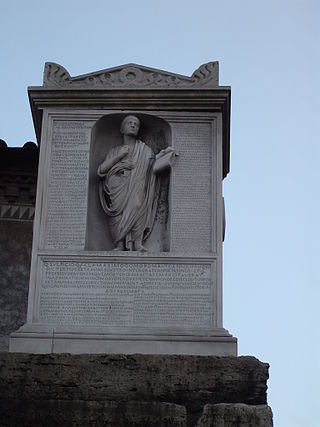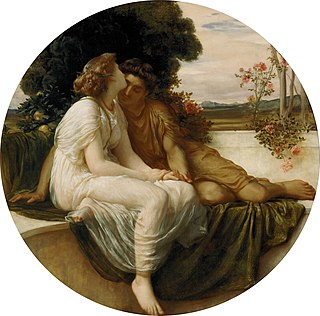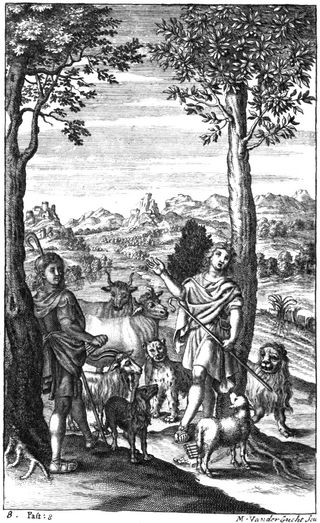
Gaius Valerius Catullus, known as Catullus, was a Latin neoteric poet of the late Roman Republic. His surviving works remain widely read due to their popularity as teaching tools and because of their personal or sexual themes.
Gaius Asinius Pollio was a Roman soldier, politician, orator, poet, playwright, literary critic, and historian, whose lost contemporaneous history provided much of the material used by the historians Appian and Plutarch. Pollio was most famously a patron of Virgil and a friend of Horace and poems to him were dedicated by both men.
Gaius Licinius Macer Calvus was an orator and poet of ancient Rome.

The history of Latin poetry can be understood as the adaptation of Greek models. The verse comedies of Plautus, the earliest surviving examples of Latin literature, are estimated to have been composed around 205–184 BC.
Puella Mea is a poem by E. E. Cummings. It is notable as his longest poem, at 290 lines. The title is Latin and translates as "My Girl", referring to Elaine Orr Thayer, his first wife, and the mother of his only child, Nancy Thayer Andrews. Von Abele considers the poem to be a departure point for the poet from the "witty romanticism" of his early works.

Catullus 64 is an epyllion or "little epic" poem written by Latin poet Catullus. Catullus' longest poem, it retains his famed linguistic witticisms while employing an appropriately epic tone.

Catullus 1 is traditionally arranged first among the poems of the Roman poet Catullus, though it was not necessarily the first poem that he wrote. It is dedicated to Cornelius Nepos, a historian and minor poet, though some consider Catullus's praise of Cornelius's history of the Italians to have been sarcastic.

Catullus 3 is a poem by Roman poet Gaius Valerius Catullus that laments the death of a pet sparrow (passer) for which an unnamed girl (puella), possibly Catullus' lover Lesbia, had an affection. Written in hendecasyllabic meter, it is considered to be one of the most famous of Latin poems.

Catullus 2 is a poem by Roman poet Gaius Valerius Catullus (c. 84 – c. 54 BCE) that describes the affectionate relationship between an unnamed puella ('girl', possibly Catullus' lover, Lesbia), and her pet sparrow. As scholar and poet John Swinnerton Phillimore has noted, "The charm of this poem, blurred as it is by a corrupt manuscript tradition, has made it one of the most famous in Catullus' book." The meter of this poem is hendecasyllabic, a common form in Catullus' poetry.
Catullus 101 is an elegiac poem written by the Roman poet Gaius Valerius Catullus. It is addressed to Catullus' dead brother or, strictly speaking, to the "mute ashes" which are the only remaining evidence of his brother's body.

Catullus 7 is a poem by Catullus addressed to his mistress Lesbia. Similar to Catullus 5, this poem revels in counting kisses, with a touch of stellar voyeurism.

Catullus 4 is a poem by the ancient Roman writer Catullus. The poem concerns the retirement of a well-traveled ship. Catullus draws a strong analogy with human aging, rendering the boat as a person that flies and speaks, with palms and purpose.

Catullus 5 is a passionate ode to Lesbia and one of the most famous poems by Catullus. The poem encourages lovers to scorn the snide comments of others, and to live only for each other, since life is brief and death brings a night of perpetual sleep. This poem has been translated and imitated many times.
Catullus 16 or Carmen 16 is a poem by Gaius Valerius Catullus. The poem, written in a hendecasyllabic (11-syllable) meter, was considered to be so sexually explicit following its rediscovery in the following centuries that a full English translation was not published until the 20th century. The first line, Pēdīcābo ego vōs et irrumābō, sometimes used as a title, has been called "one of the filthiest expressions ever written in Latin—or in any other language".

Catullus 45 is a poem by the Roman poet Catullus, describing the love between a fictional couple called Acme and Septimius. It is an over-the-top love poem that is ever so slightly tongue-in-cheek.
The gens Asinia was a plebeian family at ancient Rome, which rose to prominence during the first century BC. The first member of this gens mentioned in history is Herius Asinius, commander of the Marrucini during the Social War. The Asinii probably obtained Roman citizenship in the aftermath of this conflict, as they are mentioned at Rome within a generation, and Gaius Asinius Pollio obtained the consulship in 40 BC.

Iambus or iambic poetry was a genre of ancient Greek poetry that included but was not restricted to the iambic meter and whose origins modern scholars have traced to the cults of Demeter and Dionysus. The genre featured insulting and obscene language and sometimes it is referred to as "blame poetry". For Alexandrian editors, however, iambus signified any poetry of an informal kind that was intended to entertain, and it seems to have been performed on similar occasions as elegy even though lacking elegy's decorum. The Archaic Greek poets Archilochus, Semonides and Hipponax were among the most famous of its early exponents. The Alexandrian poet Callimachus composed "iambic" poems against contemporary scholars, which were collected in an edition of about a thousand lines, of which fragments of thirteen poems survive. He in turn influenced Roman poets such as Catullus, who composed satirical epigrams that popularized Hipponax's choliamb. Horace's Epodes on the other hand were mainly imitations of Archilochus and, as with the Greek poet, his invectives took the forms both of private revenge and denunciation of social offenders.

Eclogue4, also known as the FourthEclogue, is a Latin poem by the Roman poet Virgil. The poem is dated to 40 BC by its mention of the consulship of Virgil's patron Gaius Asinius Pollio.

Eclogue 8, also titled Pharmaceutria, is a pastoral poem by the Latin poet Virgil, one of his book of ten Eclogues. After an introduction, containing an address to an unnamed dedicatee, there follow two love songs of equal length sung by two herdsmen, Damon and Alphesiboeus. One is the song of a love-sick young man, whose girlfriend Nysa is marrying another man, Mopsus. The second is the song of a woman who, with the help of her servant Amaryllis, is performing a magic rite to try to entice her beloved Daphnis back from the city.












